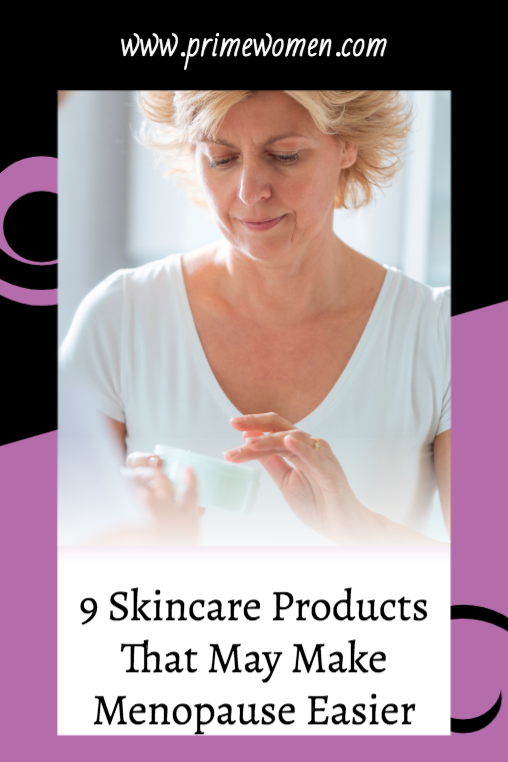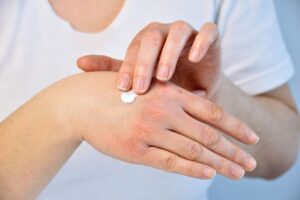Although menopause isn’t diagnosed as a condition until a full year after your last period, changes to your skin can start five to six years beforehand. Collagen is one of the most abundant proteins in our bodies, and it strengthens the bones and gives elasticity to the skin and tendons. As menopause approaches, we begin producing less estrogen and less collagen. This leads to dry, thin, or sagging skin, wrinkles, and enlarged pores.
Skin is not as resistant to the effects of the sun during and after menopause, so it is doubly essential that you use sunblock every time you leave the house. Sunscreen protects your skin from harmful ultraviolet rays that can cause darkening of the skin and age spots. Regularly using sunscreen is also one of the best ways to protect yourself from developing dangerous skin cancers.
To best protect our skin after menopause, our skincare routine needs to adapt to mitigate the loss of collagen. The American Academy of Dermatology Association recommends using a mild cleanser after menopause instead of soap to avoid over-drying the skin. Cleansers labeled as cleansing milk or cleansing lotions are often hydrating to the skin and cleansing. Moisturizing frequently, each time you bathe, before bed, and regularly throughout the day will also help to combat dry skin.
There are many cleansers and lotions marketed specifically toward aging or sensitive skin, each with different ingredients. It can be confusing to sort out which product will work best to keep your skin healthy and supple. This list will help you learn more about how the components in your skincare products make menopause a little easier.
9 Skincare Products That May Make Menopause Easier
Retinol and Retinoids
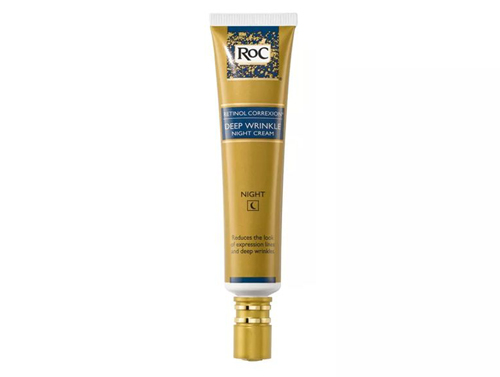
Products containing retinol are powerful weapons in the fight against aging skin. They speed up cell turnover, essentially regenerating your skin at a faster pace. Unfortunately, products with retinol can be harsh and damaging to sensitive skin. Retinoids come in several different concentrations. It may be wise to start with the gentlest formulation, retinyl palmitate, and work your way up to the preparation that works best for you.
Bakuchiol

Bakuchiol is a natural and less caustic alternative to retinol. Derived from the Psoralea Corylifolia plant, this herb is flaunted for its ability to fight signs of aging, such as thinning skin, photodamage, and wrinkles. Like retinol, it increases cell turnover, stimulating collagen production and diminishing fine lines. Unlike retinol, it is both vegan and gentle on the skin.
Ferulic Acid

Ferulic acid, also known as hydroxycinnamic acid, is a powerful agent that battles free radicals in the skin. Free radicals can lead to signs of aging, such as age spots and wrinkles. Although it is not effective at repairing damage already done to the skin, it is quite effective as a shield against the formation of new free radicals on the skin. It is particularly effective when used in conjunction with vitamin C.
Glycolic Acid
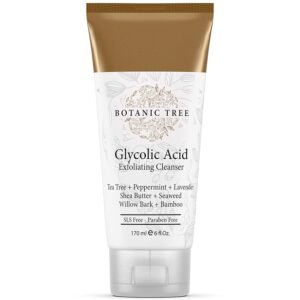
Glycolic acid is one of the most popular alpha-hydroxy acids (AHA) used in skincare. Due to its small size, this sugarcane-based acid is more effective at penetrating the skin than other AHAs. Manufacturers frequently use it in products that exfoliate the skin and in peels to treat acne and skin discoloration. While it effectively treats acne and reduces the appearance of fine lines, it is also harsh on the skin. Individuals with sensitive skin may want to avoid products with glycolic acid in them.
Hyaluronic Acid
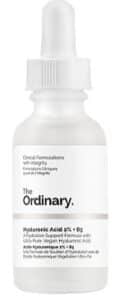
Hyaluronic acid is a sugar that is found naturally in our skin. As with estrogen and collagen, the amount of naturally occurring hyaluronic acid in the body decreases with age. When this acid is used in skincare products, its ability to draw and hold water helps keep the skin hydrated throughout the day. It is often combined with peels, vitamins, and other acids. Acids with a low PH, such as glycolic acid, may degrade the hyaluronic acid.
Lactic Acid

Dairy products have been used to soften and beautify the skin for centuries due to the lactic acid found in milk. Queen Cleopatra was said to regularly bathe in milk to retain her beauty. Lactic acid speeds up cell turnover and stimulates cell renewal, and is used in both mild over-the-counter preparations and in stronger professional peels and treatments.
Mandelic Acid
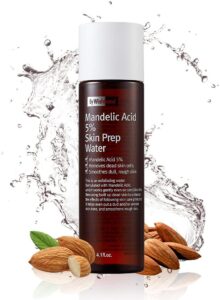
Mandelic acid, derived from bitter almonds, is an effective exfoliant that also treats sun damage and evens out pigmentation. It has a larger molecular structure than glycolic acid, making it slightly less irritating to the skin. Mandelic acid is often seen in place of glycolic acid in peels and is less likely to result in rebound pigmentation.
Niacinimide
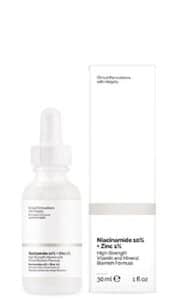
Niacinimide, a form of vitamin B3, is particularly good at treating inflammatory skin conditions. It is the best-studied topical form of vitamin B3, and it enhances barrier function. This means that it increases the production of protective proteins like keratin, which helps to make the skin less sensitive to irritants. It is sometimes used to improve the skin’s tolerance to irritating substances, such as retinol.
Ascorbic acid
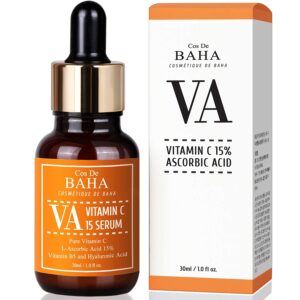
Ascorbic acid is a form of vitamin C and is often included in skincare products. It protects against sun damage, reduces pigmentation, and increases collagen production. L-ascorbic acid is the most biologically available form of vitamin C for topical use. Products often include ascorbic acid in conjunction with ferulic acid, as the ferulic acid stabilizes the ascorbic and reduces the overall acidity of the final product.
In many cases, these ingredients can be combined with one another or with other components to create a more effective product. In some instances, certain retinols and acids may be too strong in conjunction, or they may even interfere with one another.
The Bottom Line
Aging skin requires special care to remain supple and strong. There are many different options available to properly care for our skin after menopause. Utilizing cleansers, sunblock, and moisturizers designed to increase collagen production and hydrate dry, sensitive skin can help ease skin-related woes caused by menopause.
Read Next:
How To Lose Weight After Menopause
How Do I Handle A Widening Hair Part During Menopause?
